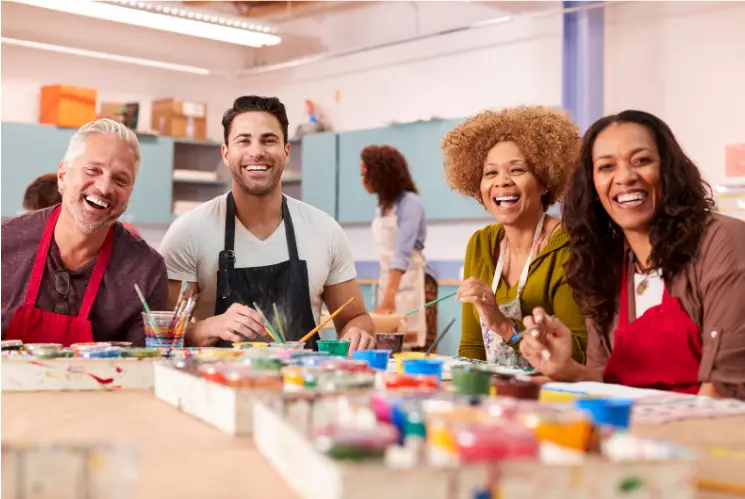The Importance of Continuous Learning: Boosting Mental Health and Longevity
Consider your brain as a vast, intricate forest. Each new piece of knowledge or skill you acquire is like planting a seedling in this cognitive wilderness. Just as a forest thrives with new growth, your mind flourishes through lifelong learning, nurturing new pathways, strengthening connections, and keeping your mental ecosystem vibrant and resilient.
In fact, whether you’re learning a new language, picking up a creative hobby, or diving into the latest technology, embracing lifelong learning keeps your brain engaged, sharp, and full of possibility. Studies show continuous mental stimulation can boost cognitive health, improve mood, and even increase longevity. Lifelong learners aren’t just adding years to their lives—they’re adding life to their years.
Every seedling planted in your cognitive forest contributes towards a healthier, happier mind.
As you nurture this sapling with practice and repetition, it grows into a sturdy tree, forming new connections with it’s neighbors.
This process isn’t just metaphorical – it’s the essence of neuroplasticity—the brain’s remarkable ability to rewire itself throughout life.
Consider this, embracing continuous learning can open doors to new opportunities, enhance your cognitive abilities, and even improve your overall well-being.
What is Lifelong Learning—and Why Does It Matter?
Lifelong learning is the continuous, voluntary, and self-motivated pursuit of knowledge, skills, and experiences throughout life. Unlike traditional education, which often ends with formal schooling or career training, lifelong learning extends far beyond these stages, embracing personal growth, curiosity, and new opportunities at any age.
Think of lifelong learning as an investment in your mind’s vitality and overall well-being. To illustrate, whether mastering a new hobby, exploring a subject that fascinates you, or learning to use the latest technology, every step you take contributes to mental stimulation, improved confidence, and a more profound sense of fulfillment.
But why does it matter? Lifelong learning isn’t just about acquiring new information; it’s about keeping your mind active and adaptable. Furthermore, research shows continuous learning strengthens neural connections, enhances memory, and improves overall cognitive function. This is particularly important as we age, helping to combat mental stagnation and reduce the risk of cognitive decline.
Lifelong Learning: The Key to Staying Sharp, Curious, and Fulfilled
On an emotional level, lifelong learning fosters purpose and joy. It helps break the monotony of routine, encourages curiosity, and provides a sense of accomplishment. Imagine the thrill of picking up a paintbrush for the first time, learning to speak a new language, or solving a challenging problem—each experience keeps your spirit young and resilient.
Moreover, lifelong learning also aligns beautifully with today’s changing world. Rapid technological advancements, industry shifts, and new ways of engaging with others mean there’s always something to learn. It empowers you to stay informed, connected, and capable of adapting to the world around you.
Whether entering retirement, exploring a second career, or simply pursuing a passion, lifelong learning matters because it enriches every phase of life. It’s about growth, possibility, and creating a mindset that says, “I’m not done yet.”
So, why stop learning? Each new skill you embrace or knowledge you gain is a small step toward a sharper mind, a healthier outlook, and a more fulfilling life.

The Science Behind Lifelong Learning: How it Benefits Your Brain
Scientific research has repeatedly shown that lifelong learning boosts neuroplasticity, keeping our brains agile and adaptable. As a result, engaging in new learning activities strengthens neural pathways, improving memory, focus, and problem-solving skills.
For example, neuroscientists have found that older adults who stay intellectually active have a 30-50% lower risk of developing dementia. Learning something challenging, like a new language or how to play a musical instrument, is a mental workout that keeps your brain sharp and responsive.
Did you know? Studies published in Neurology reveal that lifelong learners have a 15% lower risk of cognitive decline. Think of every skill you learn as planting a tree in your cognitive forest—it’s an investment in your mental health.
As a result, when you engage in learning activities, you’re essentially exercising your brain. This mental exercise can lead to:
- Improved memory function: As you acquire new knowledge, your brain becomes more efficient at storing and retrieving information, which can help counteract age-related memory decline.
- Enhanced problem-solving skills: Over time, you may notice improvements in your critical thinking and analytical skills across various aspects of your life.
- Increased attention span: Whether reading a complex text, practicing a new language, or mastering a musical instrument, these activities require concentrated effort, gradually improving your ability to focus.
- Better cognitive flexibility: Learning new skills can increase the density of white matter in your brain, which connects different brain regions and facilitates communication between them. This improved connectivity can lead to faster information processing and better overall cognitive function.
Additionally, lifelong learning fortifies our mental fortress and enhances our emotional well-being. A study published in the Journal of Happiness Studies found that adults who engaged in frequent learning activities reported higher levels of happiness and satisfaction.

Lifelong Learning and Emotional Well-Being
Learning something new injects novelty into our lives, breaking monotony, sparking curiosity, and fostering a sense of accomplishment. It aligns beautifully with the Japanese concept of Ikigai, meaning finding joy through purposeful activities.
Imagine waking up each day excited about mastering that tricky guitar chord or tackling an online photography course! By constantly learning, we’re accumulating knowledge and actively enriching our lives.
Furthermore, lifelong learning also boosts confidence and self-esteem. When you tackle a new subject or develop a skill, you prove to yourself that growth is possible at any age.
Consequently, this sense of achievement can be a powerful antidote to self-doubt and the fear of aging, reminding us that each phase of life brings new growth opportunities.
This positive self-image can have a ripple effect on other areas of your life, improving relationships, work performance, and overall life satisfaction.
Moreover, learning can also provide a sense of purpose and meaning, especially for older adults who may be transitioning out of the workforce. It offers a way to stay engaged with the world, pursue passions, and contribute meaningfully to society.
Learning isn’t just good for your brain – it’s also a powerful mood booster and a journey of emotional enrichment. When you acquire new knowledge or master a new skill, your brain rewards you with dopamine, a neurotransmitter associated with pleasure and reward.
This “feel-good” chemical can help combat stress, anxiety, and depression.
I am taking an online Udemy course on Data Analytics with Power Query to sharpen my business skills. At the same time, I’m exploring WordPress to enhance my website. Learning something new daily fuels my energy and keeps me motivated—there’s nothing quite like the spark of discovery!
Lifelong Learning in Retirement: A Golden Opportunity

Similarly, retirement offers an excellent opportunity to dive into unexplored realms of knowledge or skills:
- Online courses: From blogging to bird-watching, you’ll find an online course for almost anything! Additionally, online learning platforms have also made it easier than ever for retirees to access a wealth of knowledge from the comfort of their homes. For example, websites like Coursera, edX, and Khan Academy offer free or low-cost courses on everything from art history to computer programming.
- Creative classes: Unleash your inner artist through writing workshops, painting classes, or music lessons.
- Practical skills: Learn how to grow a vegetable garden, navigate the digital world, or pick up conversational Spanish.
Tip: Retirement is the perfect time to revisit old interests or try something you’ve always wanted to do. Consider joining community classes or local clubs where you can meet like-minded people who share your passions.
Common Obstacles to Lifelong Learning—and How to Overcome Them
It’s common to feel apprehensive about learning something new later in life. But remember, it’s never too late to learn!
While the benefits of lifelong learning are clear, it’s essential to acknowledge that learning in later life can come with its own set of challenges. Some common obstacles include:
- Declining physical abilities (e.g., vision or hearing loss)
- Fear of technology
- Lack of confidence or self-doubt (I’m too old; it’s too late to start now)
- Limited access to learning resources
Fortunately, these obstacles are far from insurmountable. Here are some strategies to overcome them:
- Adapt learning materials to suit your needs: Use large-print books, adjust screen settings, or use hearing aids if necessary.
- Start with beginner-friendly technology courses: Many libraries and community centers offer classes specifically designed to help older adults become more comfortable with computers and smartphones.
- Find age-friendly courses: Many online platforms offer courses tailored for adults.
- Connect with peers: Joining a community of learners can provide support and motivation.
- Start small: Begin with just 10 minutes a day and gradually increase your learning time.
The Social Power of Learning Together

Engaging in learning activities during retirement isn’t just a solitary activity but also a fantastic way to stay socially connected. Whether it’s joining a book club, taking language classes, or participating in local workshops, learning alongside others fosters camaraderie and builds friendships.
Socializing with other learners offers mutual support, accountability, and a sense of belonging. Combating feelings of isolation or loneliness.
Example: Think of retirees who join pottery classes, travel clubs, or even coding groups. They’re not only learning new skills, but they’re also building a supportive network that contributes to their happiness and resilience.
How to Start Your Lifelong Learning Journey Today
Ready to begin your lifelong learning adventure? Why not challenge yourself this month? Pick up that book you’ve been meaning to read, enroll in an online course, or explore a topic that intrigues you.
Here are a few practical ways to get started:
- Set a goal: Define what you’d like to learn or accomplish. Setting clear goals will keep you focused and motivated. What have you always wanted to learn? What skills would you like to develop?
- Start small: Initially, focus on one topic or skill rather than trying to tackle everything at once.
- Schedule learning time: Carve out a dedicated time each day or week for learning. Even a 15-minute daily session can make a difference over time.
- Explore different learning methods: Try a mix of reading, online courses, hands-on activities, and group classes to find what works best for you.
- Use technology to your advantage: Download educational apps, listen to podcasts, or watch educational videos on YouTube or TED Talks. Participate in online forums or discussion groups related to your areas of interest.
- Keep a learning journal: Document your progress, insights, and questions to reinforce your learning and track your growth.
- Teach others what you’ve learned: Sharing your knowledge can deepen your understanding and provide a sense of purpose.
- Stay curious: Ask questions, seek new experiences, and remain open-minded.
- Connect with local learning communities: Check out adult education programs, community colleges, or senior centers in your area. Attend lectures or events at local museums or libraries.
- Embrace failure as part of the learning process: Remember that making mistakes is a natural and valuable part of acquiring new knowledge and skills.
- Celebrate small wins: Recognize and reward yourself for progress, no matter how small. Each step forward deserves a bit of celebration!
Lifelong Learning Success Stories
Lifelong learning is more than just a concept; it’s a genuine pathway to reinvention, joy, and purpose at any stage of life. It’s worth noting that people from all walks of life embrace continuous learning to grow their skills, rediscover their passions, and make meaningful contributions to their communities. These success stories prove that it’s never too late to learn something new, transform your life, or inspire others to do the same.
The Retiree Turned Tech Enthusiast
At 68 years old, Diane decided to conquer her fear of technology by taking an online course on coding. What started as a way to understand her grandkids’ world better became a new passion. Within a year, Diane created her first app, a family recipe organizer, and began mentoring other seniors through local tech literacy workshops. Indeed, Diane’s story is a testament to how learning new skills can keep us connected, curious, and innovative, regardless of age.
The Second-Act Artist
A former accountant, John always dreamed of painting but never picked up a brush until he retired at 62. After joining a local art class, he discovered a hidden talent for watercolors. Now, at 70, John exhibits his work at local galleries, leads community workshops, and donates proceeds to art programs for underprivileged kids. His journey showcases the power of lifelong learning to unlock creativity and foster deeper connections with others.
The Language Learner Who Found New Purpose
Maria spent her career as a nurse and retired at 65 feeling a little lost. Determined to challenge herself, she began learning Spanish through an online platform. What started as a hobby turned into an opportunity for purpose. Maria now volunteers at a local clinic that serves Spanish-speaking patients, helping bridge the language gap and provide compassionate care. Her story proves that lifelong learning can empower us to make a difference while pursuing personal growth.
The Lifelong Learner Turned Educator
At 72, Michael decided to return to university to study history, his lifelong passion. After completing his degree, he began leading history seminars at his local senior center and volunteering as a museum guide. Michael’s story demonstrates that lifelong learning isn’t just about acquiring knowledge but about sharing it with others and inspiring a new generation to stay curious.
The Culinary Explorer
Susan, a 60-year-old grandmother, always loved cooking but wanted to expand her skills. She enrolled in an online international cooking course and began experimenting with recipes from around the world. Susan now hosts “global dinner nights” for friends and family, fostering cultural appreciation and community connection through food. Her story highlights how lifelong learning can bring joy, adventure, and a renewed sense of purpose to everyday life.
Your Brain on Lifelong Learning: A Path to Longevity and Vitality
Lifelong learning doesn’t just benefit your brain; it’s a key ingredient for living a longer, healthier life. Research shows continuous learning can slow cognitive decline, improve memory retention, and increase mental agility as you age. When you challenge your brain with new skills, whether is mastering a musical instruction, tackling a new language, or diving into a complex subject, you’re exercising your mind, much like physical activity strengthens your body.
As a result, this mental “workout” increases neural connections, boosts white matter density, and improves overall brain function. Even more impressive, studies have linked lifelong learning to increased life expectancy and reduced risk of dementia and Alzheimer’s disease. By keeping your mind engaged, adaptable, and curious, you’re sharpening your cognitive abilities and building a foundation for a more vibrant, fulfilling life. In essence, lifelong learning is more than a hobby, it’s a proven path to vitality, resilience, and longevity.
Small Steps, Big Wins: Celebrate Your Learning Progress
Lifelong learning is a journey, not a race, and every small step forward deserves to be celebrated. Whether you’ve completed your first online course, learned a few phrases in a new language, or picked up a creative skill, these small wins are significant milestones.
In short, acknowledging your progress keeps you motivated and reinforces the joy of learning. Remember, growth happens gradually, what feels like a tiny achievement today can lead to a more significant transformation tomorrow.
Take a moment to reflect, reward yourself, and appreciate how far you’ve come. Every new skill or piece of knowledge you acquire is a victory for your mind, your confidence, and your future self.
So, what’s your story? Who knows where your next learning adventure could take you!
As you embark on this roadmap towards continuous learning, share your progress and experiences—we’d love to hear your stories!
Remember—every seedling planted in your cognitive forest contributes to a healthier, happier mind and potentially longer life. Happy learning!
P.S.: Let’s make lifelong learning our collective mission! Share below what you’re planning to learn this month.
Together, we can inspire each other on this path towards mental wellness and longevity!
Kim, J., & Moen, P. (2002). P212-222 Retirement transitions, gender, and psychological well-being: A life-course perspective. Journal of Gerontology: Psychological Sciences.ay 2002, Pages P212–P222, https://doi.org/10.1093/geronb/57.3.P212













Add comment